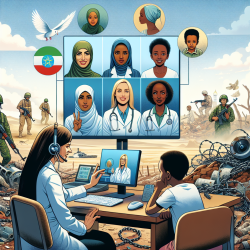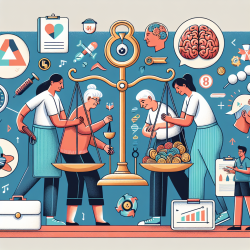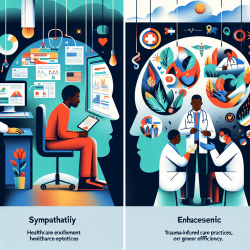Introduction
Gender-based violence (GBV) is a pervasive issue that often intensifies in conflict zones, as evidenced by the recent study conducted in Northern Ethiopia. The research, "Gender-based violence in the context of armed conflict in Northern Ethiopia," highlights the severe impact of GBV on survivors, including children. As practitioners, understanding and addressing these issues is crucial to improving outcomes for affected populations, particularly children who are often the silent sufferers in such scenarios.
Understanding the Research
The study conducted in Northern Ethiopia during a two-year armed conflict provides a comprehensive look at the types of GBV experienced, including sexual, physical, and psychological violence. The research utilized both qualitative and quantitative methods, involving in-depth interviews with survivors and healthcare providers. It documented the experiences of 1,177 GBV survivors, revealing the extensive trauma and the urgent need for multifaceted interventions.
Key Findings and Implications
- Types of Violence: The study identified various forms of violence, including gang rape, physical assault, and psychological trauma. These acts were often committed in front of family members, exacerbating the trauma.
- Health Consequences: Survivors reported severe physical injuries, mental health issues such as PTSD, and social stigmatization, leading to isolation and hopelessness.
- Need for Comprehensive Support: The research underscores the necessity for psychological, health, and economic support to rehabilitate survivors and help them lead productive lives.
Actionable Insights for Practitioners
For practitioners, especially those involved in speech-language pathology and therapy services like TinyEYE, this research offers several actionable insights:
- Holistic Approach: Incorporate a holistic approach in therapy that addresses both the psychological and physical aspects of trauma.
- Community Engagement: Work with local communities to reduce stigma and encourage survivors to seek help without fear of discrimination.
- Advocacy and Awareness: Advocate for policies that support GBV survivors and raise awareness about the impact of conflict on vulnerable populations, particularly children.
- Further Research: Encourage further research to explore the long-term impacts of GBV on children and develop targeted interventions.
Conclusion
Practitioners have a vital role in addressing the aftermath of GBV in conflict zones. By implementing the insights from this research, they can contribute to the healing and empowerment of survivors, particularly children, ensuring they have the support needed to overcome their trauma. To read the original research paper, please follow this link: Gender-based violence in the context of armed conflict in Northern Ethiopia.










